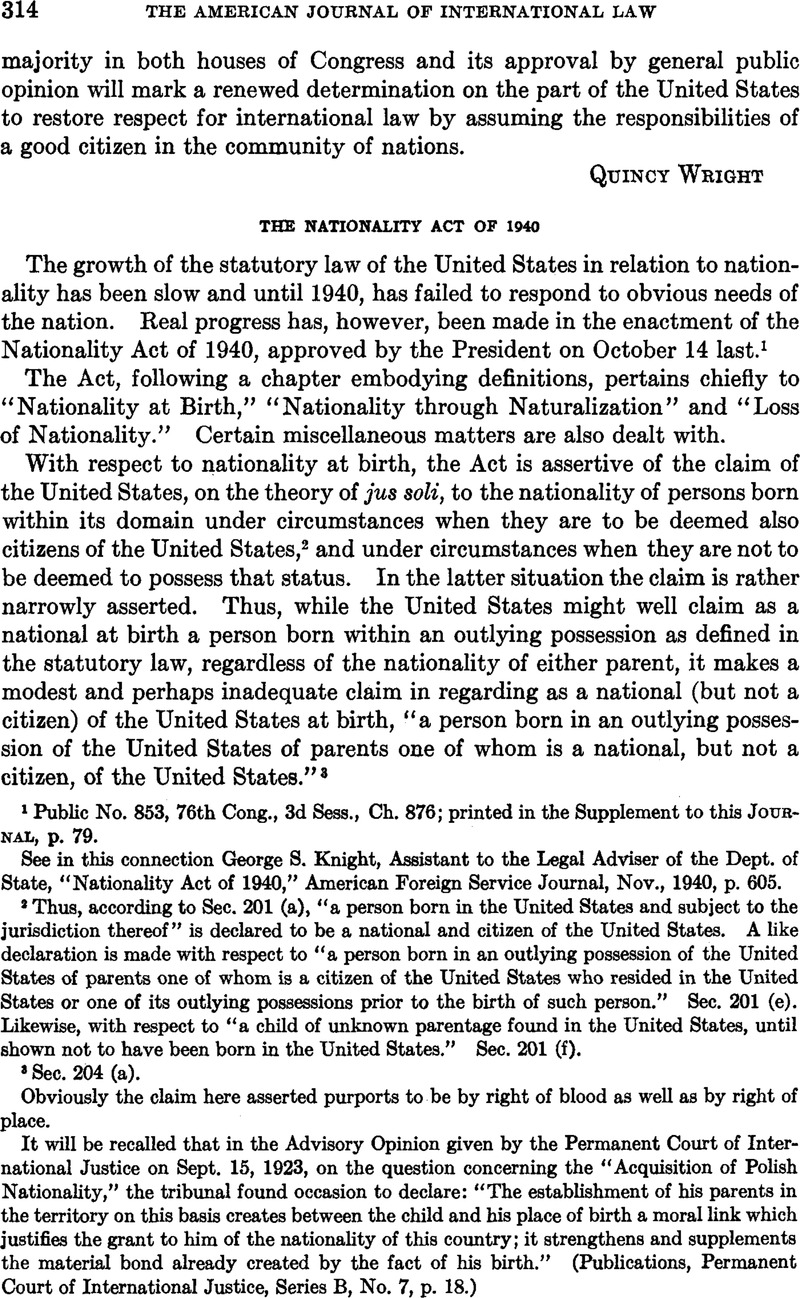No CrossRef data available.
Article contents
The Nationality Act of 1940
Published online by Cambridge University Press: 12 April 2017
Abstract

- Type
- Editorial Comment
- Information
- Copyright
- Copyright © American Society of International Law 1941
References
1 Public No. 853, 76th Cong., 3d Sess., Ch. 876; printed in the Supplement to this Journal, p. 79.
See in this connection George S. Knight, Assistant to the Legal Adviser of the Dept. of State, “Nationality Act of 1940,” American Foreign Service Journal, Nov., 1940, p. 605.
2 Thus, according to Sec. 201 (a), “a person born in the United States and subject to the jurisdiction thereof” is declared to be a national and citizen of the United States. A like declaration is made with respect to “a person born in an outlying possession of the United States of parents one of whom is a citizen of the United States who resided in the United States or one of its outlying possessions prior to the birth of such person.” Sec. 201 (e). Likewise, with respect to “a child of unknown parentage found in the United States, until shown not to have been born in the United States.” Sec. 201 (f).
3 Sec. 204(a).
Obviously the claim here asserted purports to be by right of blood as well as by right of place.
It will be recalled that in the Advisory Opinion given by the Permanent Court of International Justice on Sept. 15, 1923, on the question concerning the “Acquisition of Polish Nationality,” the tribunal found occasion to declare: “The establishment of his parents in the territory on this basis creates between the child and his place of birth a moral link which justifies the grant to him of the nationality of this country; it strengthens and supplements the material bond already created by the fact of his birth.” (Publications, Permanent Court of International Justice, Series B, No. 7, p. 18.)
4 See in this connection Lam Mow v. Nagle, 24 F. (2d) 316, affirming In re Lam Mow, 19 F. (2d) 951.
5 See the statutory laws or decrees of Argentina, Great Britain and Northern Ireland, Guatemala, Honduras, Mexico, Salvador and Spain, in Flournoy and Hudson, Nationality Laws (1929), pp. 11, 62, 322, 334, 430, 519, and 530, respectively.
6 Rev. Stat. § 1993.
7 48 Stat. 797.
8 Sec. 201 (c).
9 Sec. 201 (g), where it is declared that “the preceding provisos shall not apply to a child born abroad whose American parent is at the time of the child’s birth residing abroad solely or principally in the employment of the Government of the United States or a bona fide American, educational, scientific, philanthropic, religious, commercial, or financial organization, having its principal office or place of business in the United States, or an international agency of an official character in which the United States participates, for which he receives a substantial compensation.”
10 Sec. 201 (d).
11 Sec. 204 (b).
12 Sec. 302.
13 Sec. 303, where there is added the important proviso that “nothing in this section shall prevent the naturalization of native-born Filipinos having the honorable service in the United States Army, Navy, Marine Corps, or Coast Guard as specified in section 324, nor of former citizens of the United States who are otherwise eligible to naturalization under the provisions of section 317.”
14 See Rev. Stat. § 2169, amended Feb. 18, 1875, 18 Stat. 318.
15 Sec. 305. See also Sec. 306 in relation to the effect of some objectionable forms of conduct in time of war. See also Sec. 304 in regard to the effect of inability to speak the English language.
16 Sec. 326.
17 Sec. 329 (b). Compare the requirement of the earlier statutory law as revealed in Maney v. United States, 278 U. S. 17, and in United States v. Ness, 245 U. S. 319.
18 Sec. 331.
19 Sec. 332 (a). See in this connection communication of L. Larry Leonard, Esq., of March 4, 1941, published in the New York Times, March 11, 1941, p. 22.
20 Sec. 307.
21 Sees. 310–312.
22 Sees. 313–315. See also Sec. 316 concerning conditions prescribed for the naturalization of an adopted child.
23 Sec. 338.
24 Sec. 401 (a).
25 Id. See also Sec. 407.
26 307 U. S. 325.
27 Sec. 401 (b), (c), (d), (e), (f), (g) and (h). In connection with Sec. 401 (c) and (d), see Sec. 402. According to Sec. 403 (b), “no national under eighteen years of age can expatriate himself under subsections (b) to (g) of section 401.”
28 § 2, 34 Stat. 1228. This caused the Department of State to embark upon the task of making, as the years went on, a constantly broadening series of progressive regulations seemingly demanded by the exigencies of fresh situations.
29 Sec. 404 (a).
30 Sec. 404 (b).
31 Sec. 404 (c).
32 Sees. 405 and 406. It is significantly declared in Sec. 407: “A person having American nationality, who is a minor and is residing in a foreign State with or under the legal custody of a parent who loses American nationality under section 404 of this Act, shall at the same time lose his American nationality if such minor has or acquires the nationality of such foreign State: Provided, That, in such case, American nationality shall not be lost as the result of loss of American nationality by the parent unless and until the child attains the age of twenty-three years without having acquired permanent residence in the United States.”
33 Sec. 408.
34 This is true despite the provisions of Sec. 402 which cause a presumption of expatriation in consequence of residence abroad to be operative in two special situations where specified acts are also committed by the individual concerned, as mentioned in Sec. 401 (c) and 401 (d).
35 Sec. 410.


